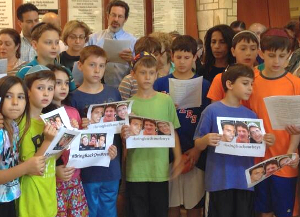The recent action of the Presbyterian Church of the United States (PCUSA) to divest from American companies doing business with Israel does not merely harm relations between our communities. It demonstrates the veracity of Hannah Arendt’s “banality of evil.” Without question, the majority of those who voted for divestment are not anti-Semitic; they just found it easier to follow the crowd, observe current political correctness, and engage in evil in the name of good.
Was it evil? Leading the charge for divestment, Robert Ross explained on June 13 that he targeted Hewlett-Packard because it “furnishes the computer hardware for the Israeli Navy and the biometric scanners for checkpoints, through which all Palestinians (but no Israelis) in the occupied West Bank must pass.†Let us examine this statement.
Among the activities of the Israeli Navy is an ongoing naval blockade of the Gaza Strip. The Gaza Strip is not occupied or controlled by Israel, but by Hamas, an internationally-recognized terrorist organization which repeatedly attempts to import weaponry for terrorist activities. Egypt also limits goods destined for the Gaza Strip, and for the same reason. Food, supplies and humanitarian shipments all reach the territory after inspection. So divestment appears to censure Hewlett-Packard for protecting Israeli civilians against terrorism.
But it is the second of the asserted reasons which makes this explicit. Biometric scanners — now used in the world’s airports to expedite frequent travelers through security — were installed for the sole benefit of residents of the Palestinian Authority who wish to cross into Israel. The problem is similar to that of the US-Mexico border, but far more lethal: the crossings needed by PA residents are exploited by terrorists to attack Israelis, whether in its cities or at the crossing itself.
As HP itself explained: “The Basel System was developed to expedite checkpoint passage in a secure environment, enabling people to get to their place of work or to carry out their business in a faster and safer way.†The PCUSA cannot claim ignorance; it is punishing Hewlett-Packard for helping Israel to avert terrorist attacks while easing the passage of working noncitizens into Israel proper.
Presumably the PCUSA does not want Palestinian families to go hungry – but the sole remaining alternative is to dismantle the checkpoints and return to the situation of 2002, in which 135 terrorist attacks massacred 451 Israelis and injured 2,348 more. The removal of many of these checkpoints has been cited in the kidnapping of three boys merely one week before this vote. The PCUSA has not endorsed any effort to protect Israeli children, and that is exactly the problem.
Neither does this action reflect a consistent policy of not investing “in militarization, human rights abuses, or threats to public health.†Motorola Solutions, for example, maintains offices in Russia, Dubai, and Vietnam, all of whose legal systems limit political and religious freedoms, including the free practice of Presbyterian Christianity. The PCUSA did not divest because Motorola Solutions devices assist in the persecution of Christians in any of these countries; only because they fight terrorism in Israel.
Ross and his allies whitewashed the consistent Palestinian history of choosing terrorism over peace. He states incorrectly that “Zionism led to the forced displacement of most of Palestine’s indigenous population†while ignoring the forced displacement of (and pogroms against) Jewish communities across the Middle East. He even criticizes those Presbyterians who object to “firing rockets into Israeli neighborhoods and in violent attacks on Israeli citizens.†If hatred and incitement are indeed prevalent in Palestinian schools and media, and violence results, he holds Israel to blame – all the while denying that this is biased or anti-Semitic.
Such appalling sentiments, though, are not without precedent in the Presbyterian Church. In 1936, C.M. Kerr, the minister of St. David’s Church in Halifax, wrote the following: “Have you ever considered that the Germans are now treating the Jews exactly as the Jews once treated other peoples whom they thought might contaminate them? That is to say they set out to exterminate them.”
The anti-Semitic fictions of the Nazi Era have been updated but not erased. In this regard, the PCUSA is returning to its roots – but not roots to which one would expect them to wish to return.

 Why does it take an event of this magnitude to unify us?
Why does it take an event of this magnitude to unify us? After they went through the land of Cana’an, these great men came home very discouraged. They knew that the Children of Israel had sinned previously, especially with the Golden Calf. They saw that the inhabitants were giants, and it would take open miracles for Israel to be victorious. So they concluded, erroneously, that Israel was no longer worthy of that level of protection — that G-d’s promise was not unconditional, that they would lose.
After they went through the land of Cana’an, these great men came home very discouraged. They knew that the Children of Israel had sinned previously, especially with the Golden Calf. They saw that the inhabitants were giants, and it would take open miracles for Israel to be victorious. So they concluded, erroneously, that Israel was no longer worthy of that level of protection — that G-d’s promise was not unconditional, that they would lose. Rabbi Shmuel Greineman writes that this is no coincidence. On the second day, Nesanel ben Tzuar of the tribe of Yissachar had to make a decision. What would he do differently than Nachshon ben Aminadav of Yehudah? Each of the remaining ten, of course, would then have to decide how to vary from the earlier ones, inevitably leading to jealousy as each one felt compelled to upstage those who gave previously. So he chose instead to let Nachshon’s gift serve as the template which they all followed. G-d found this so gratifying that He had all twelve gifts recorded in the Torah individually, although they could as easily have been stated collectively.
Rabbi Shmuel Greineman writes that this is no coincidence. On the second day, Nesanel ben Tzuar of the tribe of Yissachar had to make a decision. What would he do differently than Nachshon ben Aminadav of Yehudah? Each of the remaining ten, of course, would then have to decide how to vary from the earlier ones, inevitably leading to jealousy as each one felt compelled to upstage those who gave previously. So he chose instead to let Nachshon’s gift serve as the template which they all followed. G-d found this so gratifying that He had all twelve gifts recorded in the Torah individually, although they could as easily have been stated collectively.